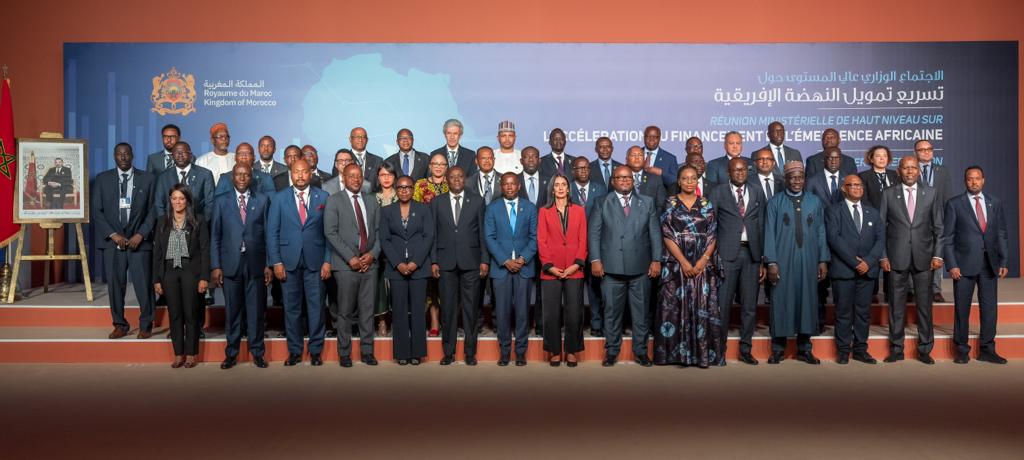Marrakech – The High-Level Ministerial Meeting on accelerating the financing of Africa’s emergence, held on Thursday on the sidelines of the WB-IMF Annual Meetings, resulted in the adoption of the “Marrakech Declaration”, which calls for a “global financial architecture that is fairer and more conducive to Africa’s development”.
In this Declaration, the 48 countries taking part in the High-Level Meeting, organized at the initiative of the Kingdom of Morocco, called for the realization of the continent’s growth priorities, which respect the sovereignty and territorial integrity of African states and contribute to the development of its populations.
They also called for a strengthening of cooperation efforts, both bilaterally and multilaterally, to support African countries in reducing their infrastructure deficit, notably through increased financing, the provision and transfer of technical and technological expertise, and capacity building.
Addressing donors, partners and friendly countries, the African countries also called for support for the emergence of a dynamic, wealth-creating private sector, capable of supporting the development of structuring infrastructure projects and bridging the infrastructure financing gap.
At the meeting, they invited the Kingdom of Morocco’s Minister of Economy and Finance to follow up on the implementation of the Declaration, and to set up an inter-African task force to share best practices and experiences in the fields of infrastructure development and financing in Africa, assisting in the development of structuring and bankable infrastructure projects, and supporting African infrastructure projects at roadshows to raise funds from potential investors.
They also agreed to support the establishment and operationalization of the Inter-African Task Force as part of an open dialogue aimed at promoting infrastructure development activities in Africa.
They also reaffirmed their commitment to working towards sustainable African co-emergence, in which infrastructure investment would play a key role as a development driver, within the framework of joint continental and regional initiatives; to capitalize on international infrastructure initiatives for the benefit of the African continent’s emergence, and to intensify their joint efforts to strengthen the business climate by improving structural conditions for investment, mobilizing financing to stimulate economic recovery, and creating a favorable environment for entrepreneurship and innovation.
The participating countries also reiterated their commitment to encouraging the establishment of a distinct climate governance model based on a spirit of partnership and African ownership, and to working to mobilize diverse sources of financing, particularly private, in order to meet Africa’s infrastructure challenge more effectively and reduce the pressure on their public resources.
They also stressed that, despite their efforts, they still face major challenges in terms of infrastructure, which plays a crucial role in developing their industries and value chains, creating jobs, improving the standard of living of their populations, and contributing to achieving the objectives of Agendas 2030 and 2063.
The Marrakech Declaration asserted that the question of financing remains a crucial issue to be addressed for the development of ambitious infrastructure programs, capable of bridging the infrastructure gap from which African countries suffer, and that this financing effort cannot be ensured by public resources alone.
The Marrakech Declaration points out that the lack of active, long-term international solidarity is considerably slowing down the momentum of climate action in Africa, penalizing the continent, which until 2020 has received only 12% of the annual flows of climate financing it needs.
The participants in this High-Level Ministerial Meeting agreed that the progress made by the continent at various levels, particularly in terms of infrastructure, has resulted in the implementation of large-scale projects, and bears witness to their countries’ determination to make good Africa’s infrastructure deficit and achieve sustainable development and solid growth.
They also noted that “the consolidation of intra-continental economic relations, in line with the objectives and commitments of our countries to develop South-South cooperation, is a key condition for the future development of our continent, and requires the establishment of quality infrastructures to support these ambitions”.
In their Declaration, the African countries thanked His Majesty King Mohammed VI “for His leadership and commitment to strengthening inter-African cooperation, as well as the government and people of Morocco for hosting the Annual Meetings of the World Bank Group and the International Monetary Fund, and for the warm hospitality extended to all participants”.
They also congratulated the Kingdom of Morocco on its designation as host country for the 2030 World Cup, which represents a unique opportunity to catalyze growth and infrastructure modernization in the Kingdom, and demonstrates confidence in Africa’s ability to meet the greatest challenges.
